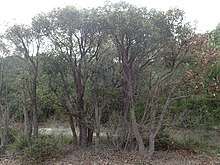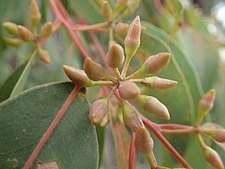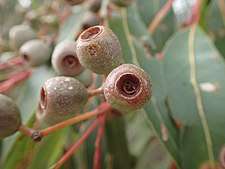Eucalyptus staeri
Eucalyptus staeri, commonly known as Albany blackbutt,[2] is a species of small tree or a mallee and is endemic to the south-west corner of Western Australia. It has rough bark on the trunk and branches, thick, lance-shaped adult leaves, flowers buds in groups of between seven and fifteen, creamy white flowers and shortened spherical fruit.
| Albany blackbutt | |
|---|---|
 | |
| Eucalyptus staeri in the Torndirrup National Park | |
| Scientific classification | |
| Kingdom: | Plantae |
| Clade: | Tracheophytes |
| Clade: | Angiosperms |
| Clade: | Eudicots |
| Clade: | Rosids |
| Order: | Myrtales |
| Family: | Myrtaceae |
| Genus: | Eucalyptus |
| Species: | E. staeri |
| Binomial name | |
| Eucalyptus staeri | |


Description
Eucalyptus staeri is a tree or a mallee that typically grows to a height of 2–15 m (6 ft 7 in–49 ft 3 in) and forms a lignotuber. It has rough, fibrous, fissured, greyish brown bark on the trunk and branches thicker than about 40 mm (1.6 in). Young plants and coppice regrowth have stems that are square in cross-section and leaves that are a lighter shade of green on the lower side, egg-shaped to broadly lance-shaped, 80–140 mm (3.1–5.5 in) long and 30–60 mm (1.2–2.4 in) wide. Adult leaves are the same shade of green on both sides, lance-shaped, 80–125 mm (3.1–4.9 in) long and 18–35 mm (0.71–1.38 in) wide on a petiole 10–23 mm (0.39–0.91 in) long. The flower buds are arranged in leaf axils in groups of between seven and fifteen on a flattened, unbranched peduncle 14–23 mm (0.55–0.91 in) long, the individual buds on pedicels 5–19 mm (0.20–0.75 in) long. Mature buds are cylindrical to spindle-shaped, 13–20 mm (0.51–0.79 in) long and 5–7 mm (0.20–0.28 in) wide with a conical operculum. Flowering occurs from August or October to December or January or April and the flowers are creamy white. The fruit is a woody, shortened spherical capsule 14–23 mm (0.55–0.91 in) long and 16–22 mm (0.63–0.87 in) wide with the valves below rim level.[2][3][4]
Taxonomy and naming
Albany blackbutt was first formally described in 1914 by Joseph Maiden in the Journal and Proceedings of the Royal Society of New South Wales and given the name Eucalyptus marginata var. staeri.[5][6] In 1924 Stephen Lackey Kessell and Charles Gardner raised the variety to species status as Eucalyptus staeri.[7] The specific epithet (staeri) honours John Staer (1850-1933) who collected the type specimens.[6][8]
Distribution and habitat
Eucalyptus staeri is found mostly in the south west corner of the Great Southern region of Western Australia centred around the town of Albany[2] with smaller populations extending north into the Wheatbelt. The preferred habitat is sandy soil in near-coastal scrubland.[4][9]
Conservation status
This eucalypt is classified as "not threatened" by the Western Australian Government Department of Parks and Wildlife.[2]
See also
References
- "Eucalyptus staeri". Australian Plant Census. Retrieved 30 December 2019.
- "Eucalyptus staeri (Maiden) Kessell & C.A.Gardner Albany Blackbutt". Florabase. Western Australian Herbarium. Retrieved 3 January 2016.
- "Eucalyptus staeri". Euclid: Centre for Australian National Biodiversity Research. Retrieved 29 May 2020.
- Chippendale, George M. "Eucalyptus staeri". Australian Biological Resources Study, Department of the Environment and Energy, Canberra. Retrieved 30 December 2019.
- "Eucalyptus marginata var. staeri". APNI. Retrieved 30 December 2019.
- Maiden, Joseph (1914). "Notes of Eucalyptus (with descriptions of new species) No. II". Journal and Proceedings of the Royal Society of New South Wales. 47 (2): 230. Retrieved 30 December 2019.
- "Eucalyptus staeri". APNI. Retrieved 30 December 2019.
- "Staer, John (1850 - 1933)". Council of Heads of Australasian Herbaria Australian National Herbarium. Retrieved 30 December 2019.
- "Wildflower Species - Major Plant Families". Australia's South West. 2016. Retrieved 3 January 2016.